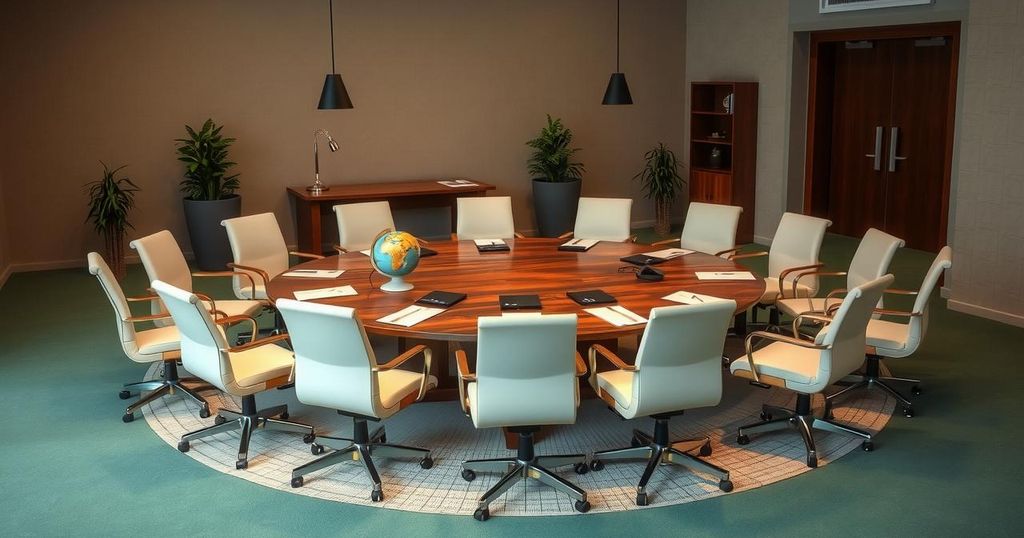Southeast Asian leaders met in Laos to address the civil war in Myanmar and territorial tensions in the South China Sea during the annual ASEAN summit. The forum involves discussions with global powers and highlights ASEAN’s ongoing challenges in mediating conflict and promoting regional cooperation. Key themes include the upcoming elections in Myanmar and the strained U.S.-China relations over maritime disputes.
On Wednesday in Vientiane, Laos, leaders from Southeast Asia convened for an annual summit centered on urgent matters, namely the ongoing civil conflict in Myanmar and increasing territorial disputes in the South China Sea. This gathering, part of the Association of Southeast Asian Nations (ASEAN) forum, will set the stage for subsequent discussions with global powers such as China, the United States, and Russia, all of which are vying for influence in the region. The talks occur at a time when the repercussions of escalating violence in the Middle East may also arise, albeit with Southeast Asia facing only indirect impacts from said conflict. While the effectiveness of ASEAN has been questioned, it continues to serve as a platform that facilitates dialogue among superpowers and its member states. ASEAN’s ten member nations—Indonesia, Thailand, Singapore, the Philippines, Vietnam, Malaysia, Myanmar, Cambodia, Brunei, and Laos—are also set to engage with external partners from Japan, South Korea, India, and Australia on critical issues spanning economic cooperation, climate change, and energy policy. During the summit, Lao Prime Minister Sonexay Siphandone extended a warm welcome to new leaders from Thailand and Singapore, emphasizing collaboration. He stated, “We help one another, and work together the ASEAN way. We will discuss and strengthen cooperation between ASEAN members and other dialogue partners, along with upholding the unity and centrality of ASEAN.” Thailand’s Prime Minister, Paetongtarn Shinawatra, the youngest leader in the bloc at 38, and Singapore’s Prime Minister Lawrence Wong, who took office in May following Lee Hsien Loong’s two-decade tenure, make their debut at this summit. Meanwhile, President Joko Widodo of Indonesia has opted out of attendance, sending Vice President Ma’ruf Amin in his place, as preparations for his successor Prabowo Subianto to assume office continue. U.S. Secretary of State Antony Blinken is stepping in for President Joe Biden at the meetings, while China will be represented by Premier Li Qiang. Fraying relations between the U.S. and China, particularly the latter’s aggressive maneuvers in the contested South China Sea, are expected to be pivotal topics of discussion. Notably, ASEAN members such as Vietnam, the Philippines, Malaysia, and Brunei have competing territorial claims with China, which asserts sovereignty over nearly the entire South China Sea. Negotiations aimed at establishing a code of conduct between ASEAN nations and China have encountered sluggish progress, further complicated by incidents of maritime clashes this year involving Chinese and Philippine vessels. Although Myanmar’s military regime is at the forefront of ASEAN’s challenges—having overthrown a democratically elected government in 2021 and sparking ongoing civil unrest—Blinken is anticipated to encourage ASEAN to maintain pressure on Myanmar’s leaders. The U.S. remains apprehensive about the military government’s proposed elections in 2024, fearing these would exacerbate violence rather than foster peace. ASEAN’s credibility has been substantially undermined by the conflict in Myanmar, where it is widely believed that the military controls significantly less than half of the nation. Notably, Thailand will host an informal consultation on the Myanmar crisis in December, though it remains uncertain who from Myanmar will be able to participate. The recent participation of Aung Kyaw Moe, the permanent secretary of Myanmar’s Foreign Ministry, at this summit marks a significant moment as it is the first high-level attendance from Myanmar since the country was barred from sending political representatives in late 2021. Analyzing this decision, Lina Alexandra, a senior researcher at Indonesia’s Centre for Strategic and International Studies, noted that this could reflect an image of ASEAN compromising, thereby indicating the bloc’s fatigue in addressing the Myanmar crisis.
The meeting of Southeast Asian leaders in Laos comes in the context of a civil war in Myanmar and ongoing territorial disputes in the South China Sea. The conflict in Myanmar, which erupted following a military coup in 2021, has led to widespread violence and instability. ASEAN has struggled to effectively mediate this crisis, culminating in criticism regarding its lack of meaningful intervention. Simultaneously, tensions in the South China Sea involve multiple ASEAN members contesting China’s expansive territorial claims. The ongoing negotiations for a code of conduct governing maritime behavior among these parties have seen limited progress, causing further friction between member states and regional powers. Additionally, relations between major powers such as the United States and China have been increasingly strained, impacting the political dynamics in Southeast Asia. The 10 member states of ASEAN are navigating these complexities while also addressing pressing regional issues such as economic cooperation and climate change. The existence of new leadership across several ASEAN nations is expected to influence discussions and the bloc’s approach moving forward.
The ASEAN summit in Laos highlights significant regional challenges, primarily the ongoing conflict in Myanmar and contentious maritime disputes with China. As Southeast Asian leaders convene alongside global powers, the agenda is expected to encompass vital discussions concerning peace in Myanmar and the South China Sea, alongside other issues affecting member nations. Despite operating in a complex geopolitical landscape, the emphasis on fostering unity and cooperation among member states remains central to ASEAN’s objectives, as exemplified by Prime Minister Siphandone’s remarks on collaboration. However, the efficacy of ASEAN as a mediating force remains under scrutiny, particularly in the face of both internal strife and external pressures from major global powers.
Original Source: www.thespec.com




